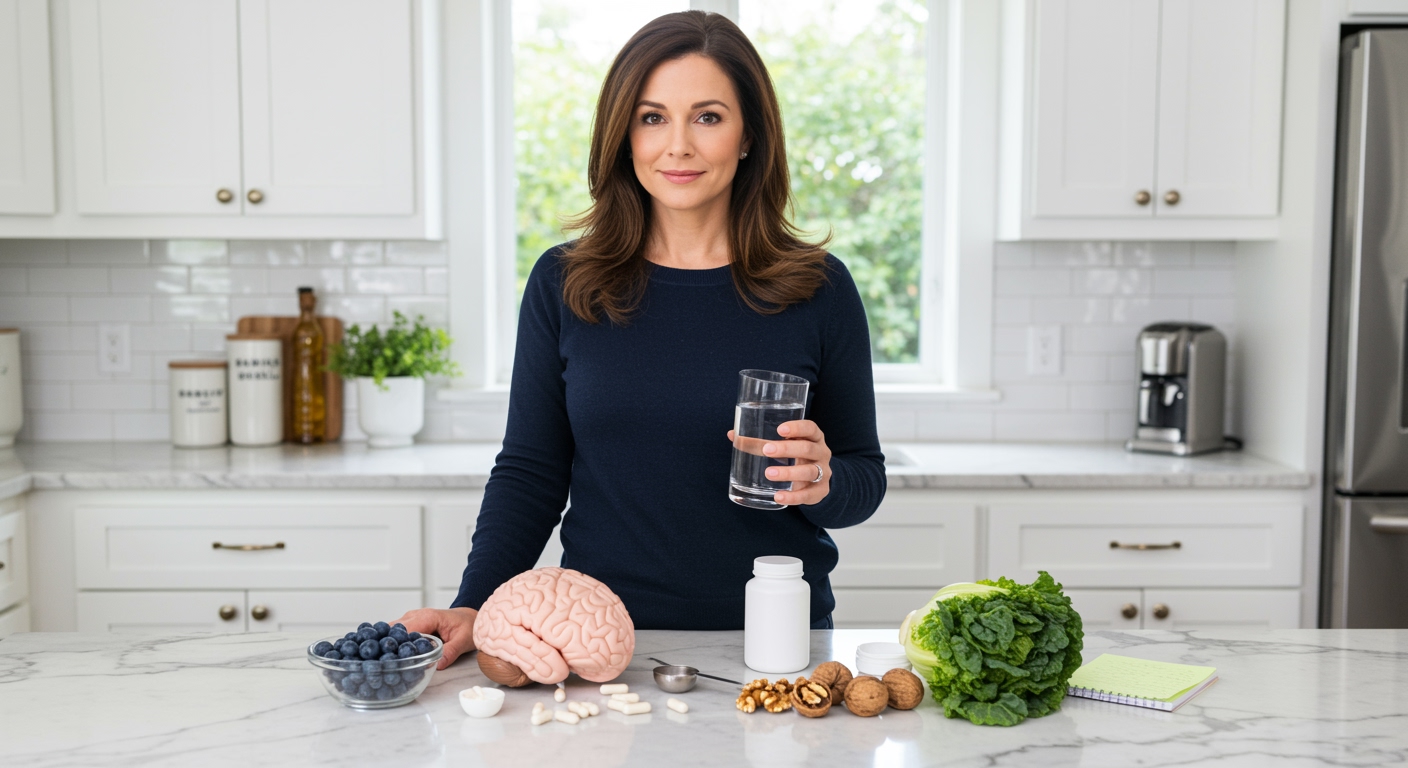✪ Key Highlight: New research reveals creatine supplements protect brain cells from injury, dementia, and depression through energy pathways.
Introduction
Most people think creatine only helps build bigger muscles.
Scientists now discover this popular supplement also protects your brain from serious damage and mental health problems.
Hi, I’m Abdur, your nutrition coach and today I’m going to analyze this groundbreaking research showing how creatine supplements can shield your brain from dementia, depression, and traumatic injuries.
How Does Creatine Actually Protect Your Brain?
Your brain needs constant energy to function properly.
When blood flow gets cut off during a stroke or head injury, brain cells start dying because they cannot get enough oxygen.
Creatine helps your body make ATP, which is the main energy source for all your cells.
This supplement can produce energy even when oxygen levels drop dangerously low.
Dr. Dalleck explains that creatine makes perfect sense for neuroprotection because it keeps brain cells alive when normal energy production fails.
Animal studies show creatine reduces tissue damage in brain injuries and helps restore normal brain metabolism faster.
✪ Fact: Your brain uses about 20% of your total daily energy despite being only 2% of your body weight.
Can Creatine Work As A Brain Chemical Messenger?
Scientists found something surprising about creatine in brain tissue.
This supplement appears inside synaptic vesicles, which are tiny containers that store chemical messengers between nerve cells.
Synaptic vesicles release neurotransmitters that help brain cells communicate with each other.
When creatine acts like a neurotransmitter, it can influence how cortical neurons talk to each other.
Cortical neurons are brain cells in your outer brain layer that control thinking, memory, and decision-making.
This discovery suggests creatine helps fine-tune your brain’s communication network for better mental performance.
Healthy neurotransmission is essential for learning new information and forming lasting memories.
✪ Pro Tip: Take creatine with carbohydrates to improve its uptake into brain tissue.
What Happens In Your Memory Center?
Your hippocampus is a curved brain region that looks like a seahorse.
This area controls how you form new memories and learn complex information.
Research shows creatine boosts mitochondrial activity specifically in hippocampal neurons.
Mitochondria are tiny power plants inside your cells that produce energy for all cellular functions.
When hippocampal neurons get more energy, they can function better under stress and challenging conditions.
Scientists also discovered creatine has antioxidant effects that reduce harmful oxidative stress in brain tissue.
Oxidative stress damages brain cells and contributes to aging and neurodegenerative diseases like Alzheimer’s and Parkinson’s.
✪ Note: The hippocampus is one of the first brain regions affected by Alzheimer’s disease.
Does Creatine Help With Serious Brain Diseases?
Animal research shows promising results for several devastating brain conditions.
Dr. Degnan notes encouraging results for addressing neuroendocrine problems in diseases like ALS, multiple sclerosis, and Parkinson’s.
Neuroendocrine problems occur when your nervous system cannot properly control hormone production and release.
ALS is a disease that destroys motor neurons and causes progressive muscle weakness and paralysis.
Multiple sclerosis attacks the protective covering around nerve fibers, disrupting communication between brain and body.
Parkinson’s disease kills dopamine-producing brain cells, leading to tremors, stiffness, and movement problems.
While researchers do not have hard human data yet, animal studies suggest creatine might slow disease progression in these conditions.
✪ Fact: Over 6 million Americans currently live with Alzheimer’s disease or related dementias.
Can Athletes Protect Their Brains From Concussions?
Contact sports like football, hockey, and boxing cause repeated head impacts.
These impacts can lead to concussions and long-term brain damage over time.
Early human studies in athletes suggest creatine may help the brain recover from concussion injuries.
The supplement appears to stabilize brain metabolism after head trauma occurs.
Creatine also reduces injury-related changes in important brain chemicals that affect mood and thinking.
Researchers now want to conduct larger clinical trials to confirm these protective benefits.
They also need to figure out the best doses and timing for maximum brain protection.
✪ Pro Tip: Athletes in contact sports should consider creatine supplementation before the season starts.
The Bottom Line
Creatine is emerging as a powerful brain protector that goes far beyond muscle building.
Smart supplementation today can protect your most valuable asset tomorrow – your brain.
What questions do you have about using creatine for brain health, and have you noticed any cognitive benefits from this supplement?
References
At NutritionCrown, we use quality and credible sources to ensure our content is accurate and trustworthy. Below are the sources referenced in creating this article:
- PubMed: Creatine Neuroprotection Research
- Frontiers in Nutrition: Creatine and Brain Health
- PMC: Creatine Brain Protection Study
- Taylor & Francis: Creatine Research Review
- News Medical: Creatine Neuroprotection News





